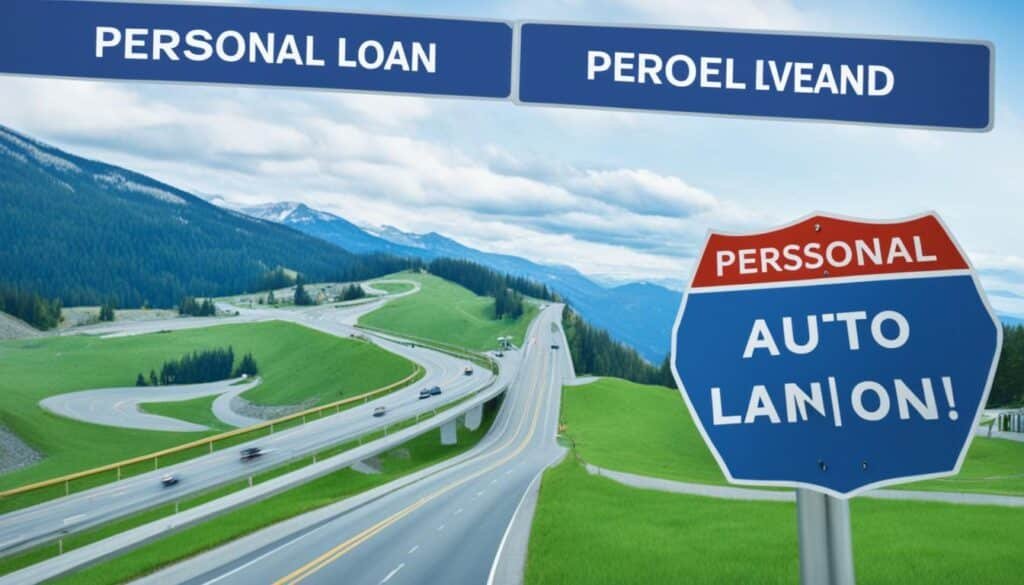Table of Contents
TogglePersonal Loan For Car Are you in the market for a new car? Whether you’re looking to upgrade to a more reliable vehicle or purchase your dream car, financing options are crucial for turning your car buying dreams into reality. One popular option to consider is a personal loan for a car, which provides quick and easy financing without the need for collateral.
Applying for a personal loan for a car is hassle-free and can be obtained from various lenders, including banks and credit unions. With this type of financing, you can secure the funds you need to purchase your desired vehicle without the stress of providing collateral, such as a home or car.
Personal loans offer flexibility and convenience, allowing you to obtain the funds you need quickly and easily. Whether you’re buying a car from a private seller or a dealership, a personal loan can streamline the financing process and help you get behind the wheel of your new car sooner.
Key Takeaways:
- A personal loan for a car offers quick and easy financing options for car buyers.
- Personal loans do not require collateral, making them a hassle-free financing solution.
- Applying for a personal loan for a car is a straightforward process with various lenders.
- Personal loans provide flexibility and convenience for purchasing a car from a private seller or a dealership.
- Consider the benefits of personal loans, such as low APR and no hidden costs or fees.
Buying a Car from a Private Seller
When purchasing a car from a private seller, you have various financing options to consider. While some buyers may choose to use their savings or secure an auto loan, a personal loan can be a convenient and flexible option for financing your car purchase. Personal loans provide the necessary funds to buy a car from a private seller, and the process is quick and straightforward.
Here are the key advantages of using a personal loan for buying a car from a private seller:
- Quick and hassle-free financing solution
- No need for collateral such as a home or car
- Flexibility to choose loan terms that suit your needs
- Ability to negotiate a better price with cash in hand
With a personal loan, you can secure funds without the limitations of traditional auto loans. Whether you’re buying a used car or a unique vehicle from a private seller, a personal loan can provide the financial support you need.
When considering a personal loan for your car purchase, it’s essential to compare loan offers from different lenders to ensure you get the best interest rates and terms. Additionally, consider the loan amount you require, repayment period, and any associated fees. By carefully evaluating your options, you can make an informed decision that aligns with your financial goals.
Benefits of Buying from a Private Seller
Buying a car from a private seller can offer several advantages:
- Potential for lower prices: Private sellers are often more willing to negotiate on price compared to dealerships.
- Less sales pressure: Private sellers do not have the same sales targets as dealerships, creating a more relaxed buying environment.
- Access to unique vehicles: Private sellers may have unique or specialized vehicles that are not commonly found in dealerships.
However, it’s important to note that buying from a private seller also comes with some risks. Unlike dealerships, private sellers do not offer warranties or guarantees. Therefore, thorough inspections and due diligence are crucial to ensure you’re making a safe and reliable purchase.
Now that you understand the benefits of a personal loan for buying a car from a private seller, you can explore this financing option to make your car purchase a reality.
| Pros of Personal Loans for Private Seller Car Purchase | Cons of Personal Loans for Private Seller Car Purchase |
|---|---|
| Quick and straightforward process | Higher interest rates compared to auto loans |
| No collateral required | May have stricter eligibility criteria |
| Flexible loan terms | No warranties or guarantees |
Benefits of a Personal Loan for Car Purchase

Personal loans offer several benefits for individuals looking to finance a car purchase. These loans provide quick access to funds, allowing buyers to secure their desired vehicle without delay. Additionally, personal loans often have low annual percentage rates (APR), making them an affordable financing option. With no hidden costs or fees, borrowers can have peace of mind knowing they won’t incur any unexpected expenses.
Quick and Easy Financing
A personal loan for a car purchase offers a quick and straightforward financing solution. Unlike traditional auto loans that may involve complex processes, personal loans can be obtained with ease. Borrowers can conveniently apply online or at a local branch, streamlining the loan approval process. These loans eliminate the need for extensive paperwork, making it a hassle-free experience for buyers.
Low APR
Personal loans typically come with low annual percentage rates (APR). This means borrowers can enjoy lower interest charges compared to other financing options. The low APR translates to reduced monthly payments, helping individuals manage their finances effectively.
No Hidden Costs or Fees
One of the key advantages of personal loans for car purchase is the absence of hidden costs or fees. Unlike some other types of loans, personal loans provide transparency in their terms and conditions. Borrowers can rest assured that there are no hidden charges that may increase the overall cost of the loan.
Flexible Loan Amounts
Personal loans for car purchase offer borrowers the flexibility to choose the loan amount that fits their budget. Whether individuals are looking to buy a new or used car, personal loans can be customized to meet their specific financing needs. This ensures that borrowers have access to the necessary funds without any constraints.
Ability to Negotiate
When using a personal loan for a car purchase, buyers have the advantage of negotiating the price with the seller. Unlike auto loans that come with fixed loan amounts based on the car’s value, personal loans provide borrowers with the flexibility to negotiate a better deal. This can result in potential savings and a more favorable buying experience.
| Benefits | Description |
|---|---|
| Quick and Easy Financing | Streamlined process for obtaining funds |
| Low APR | Affordable financing option with reduced interest charges |
| No Hidden Costs or Fees | Transparent terms and conditions with no unexpected expenses |
| Flexible Loan Amounts | Customizable loan amounts to suit individual financing needs |
| Ability to Negotiate | Opportunity to negotiate a better deal with the seller |
Secured vs. Unsecured Personal Loans

When considering a personal loan for a car purchase, borrowers have the option to choose between secured and unsecured personal loans. These two types of loans differ in terms of collateral and creditworthiness requirements.
A secured personal loan requires collateral to secure the loan amount. Collateral can be in the form of a valuable asset, such as a home or car, which the lender can claim if the borrower fails to repay the loan. This collateral acts as a safeguard for the lender, reducing the risk of non-payment. Secured personal loans typically have lower interest rates compared to unsecured loans due to the collateral involved.
An unsecured personal loan, on the other hand, does not require collateral. Instead, the loan approval is solely based on the borrower’s creditworthiness, including factors such as credit score, income, and employment history. Lenders assess the borrower’s ability to repay the loan without any collateral as security. Unsecured personal loans generally have higher interest rates compared to secured loans, reflecting the increased risk for the lender.
The choice between a secured personal loan and an unsecured personal loan depends on the borrower’s credit score and personal preferences. Here are some factors to consider:
- Collateral: Secured personal loans require collateral, while unsecured personal loans do not.
- Credit Score: Unsecured personal loans heavily rely on the borrower’s creditworthiness, including credit score, to determine loan approval and interest rates.
- Interest Rates: Secured personal loans generally offer lower interest rates due to the collateral involved, while unsecured personal loans tend to have higher interest rates.
Before deciding on the type of personal loan, borrowers should carefully evaluate their credit score, financial situation, and willingness to provide collateral. It’s important to choose a loan that aligns with individual needs and preferences.
Applying for a Personal Loan for a Car

Applying for a personal loan for a car is a straightforward process that allows borrowers to secure the funds they need for their vehicle purchase. To begin the loan application process, borrowers will be required to provide essential personal information such as their name, date of birth, and occupation. This information helps lenders assess the borrower’s identity and financial stability.
In addition to basic personal details, lenders may also request specific documentation to complete the application. This documentation typically includes proof of income, residence, and insurance. Proof of income demonstrates the borrower’s ability to repay the loan, while proof of residence confirms their current address. Insurance documentation is necessary to protect both the borrower and the lender in case of unforeseen events.
The loan amount that borrowers can qualify for depends on their credit score and other factors. Lenders evaluate creditworthiness by reviewing the borrower’s credit history, including their credit score and payment history. A higher credit score generally increases the chances of securing a larger loan amount.
It is important for borrowers to gather all the necessary documents and ensure their credit score is in good standing before applying for a personal loan for a car. By being prepared and organized, borrowers can streamline the application process and increase their chances of securing the loan they need.
| Documents Required for Applying for a Personal Loan for a Car | Benefits of a High Credit Score |
|---|---|
| Proof of income | Higher loan amount eligibility |
| Proof of residence | Favorable interest rates |
| Insurance documentation | Better chances of loan approval |
By carefully completing the loan application and providing all required documentation, borrowers can move through the loan approval process smoothly and efficiently.
Applying for a personal loan for a car is a crucial step towards securing financing for your vehicle. By understanding the application process, gathering the necessary documents, and maintaining a good credit score, you can confidently apply for a loan and take a step closer to driving your dream car.
Auto Loans vs. Personal Loans for Car Purchase

When it comes to financing options for buying a car, there are two main choices: auto loans and personal loans. Each option has its own set of advantages and disadvantages that buyers should consider before making a decision.
Auto loans are specifically designed for vehicle purchases. These loans are secured by the car itself, meaning that if the borrower fails to repay the loan, the lender can repossess the car. Auto loans usually come with lower interest rates compared to personal loans, making them an attractive option for those looking for favorable terms. However, it’s important to note that auto loans typically have stricter eligibility criteria and require a good credit score to qualify.
On the other hand, personal loans can be used for various purposes, including buying a car. Personal loans are unsecured, which means they don’t require any collateral. This can be advantageous for individuals who don’t want to use their car as security or don’t have a high credit score. Personal loans also offer more flexibility in terms of loan amount and repayment options. However, they often come with higher interest rates compared to auto loans.
To help you understand the key differences between auto loans and personal loans for car purchases, take a look at the following table:
| Auto Loans | Personal Loans |
|---|---|
| Designed specifically for vehicle purchases | Can be used for various purposes |
| Secured by the car itself | Unsecured, no collateral required |
| Lower interest rates | Higher interest rates |
| Strict eligibility criteria | More flexible eligibility |
It’s important to choose the right loan option based on your individual needs and circumstances. If you have a good credit score and are specifically looking for financing for a car purchase, an auto loan may be the more suitable option. However, if you prefer flexibility and don’t want to put your car at risk, a personal loan could be the better choice. Consider your financial situation, credit score, and long-term goals before deciding which loan type is right for you.
Now let’s take a look at some advantages and disadvantages of auto loans and personal loans for car purchases:
Advantages of Auto Loans:
- Lower interest rates
- Specifically designed for car purchases
- Secured by the car itself
Disadvantages of Auto Loans:
- Strict eligibility criteria
- Requires a good credit score
- Risk of car repossession if loan is not repaid
Advantages of Personal Loans:
- More flexibility in loan amount and purpose
- No collateral required
- Can be used for various purposes
Disadvantages of Personal Loans:
- Higher interest rates
- May require a higher credit score
- Not specifically tailored for car purchases
By considering the differences, advantages, and disadvantages of auto loans and personal loans, you can make an informed decision that aligns with your financial situation and goals. Remember to compare loan offers from different lenders to find the best terms and rates that meet your needs.
Getting an Instant Auto Loan

Looking to finance your car purchase quickly and conveniently? Instant auto loans provide the perfect solution. With same-day loan approval, you can secure the funds you need in less than an hour, allowing you to drive away in your dream car without delay.
Obtaining an instant auto loan is simple, as long as you meet a few requirements. Lenders offer these loans to borrowers who have a steady income, a good credit history, and a valid driver’s license. Meeting these criteria ensures a smooth application process and a higher chance of loan approval.
When it comes to instant auto loans, you have multiple options. Traditional lenders such as banks and credit unions offer these loans, as well as online lenders who specialize in quick and hassle-free financing. Comparing different lenders can help you find the best terms, interest rates, and repayment options.
Benefits of Getting an Instant Auto Loan:
- Quick and convenient financing for your car purchase
- Same-day loan approval
- Flexible repayment options
- Competitive interest rates
- Negotiating power for better deals on the car price
- Savings on time and effort
Whether you’re buying a new or used car, an instant auto loan can provide the financing you need with minimal hassle. The streamlined process allows you to focus on finding the perfect vehicle while knowing that your financing is in place.
Instant Auto Loan vs. Traditional Auto Loan
If you’re wondering why you should choose an instant auto loan over a traditional auto loan, consider the significant advantages:
| Instant Auto Loan | Traditional Auto Loan |
|---|---|
| Quick and hassle-free loan approval | Lengthy loan application process |
| No extensive paperwork required | Extensive documentation and verification |
| Same-day fund disbursement | Waiting period for fund disbursement |
| Flexible repayment options | Fixed repayment terms |
| Competitive interest rates | Variable interest rates |
With an instant auto loan, you can enjoy a streamlined experience and get behind the wheel of your new car without unnecessary delays. Make the most of your car-buying journey with the benefits and convenience of an instant auto loan.
Getting an Auto Loan with Bad Credit

Securing an auto loan with bad credit is possible, although it often comes with challenges such as higher interest rates and additional documentation requirements. Lenders take into account creditworthiness when determining the loan terms for borrowers with bad credit. If you find yourself in this situation, it’s important to explore your options and consider alternative financing solutions.
Higher Interest Rates for Bad Credit Auto Loans
Having bad credit can result in higher interest rates on your auto loan compared to borrowers with good credit. Lenders consider bad credit as an indicator of increased risk, and they compensate for this risk by charging higher interest rates. This means that over the course of your loan, you may end up paying more in interest compared to borrowers with better credit.
Additional Documentation for Bad Credit Auto Loans
When applying for an auto loan with bad credit, lenders may request additional documentation to assess your creditworthiness. This can include proof of income, employment verification, bank statements, and references. Providing these documents helps lenders gain a better understanding of your financial situation and may increase your chances of getting approved for a loan.
“While bad credit can make it more challenging to secure an auto loan, it’s important to remember that it’s not impossible. With thorough research and careful consideration of your options, you can find lenders who specialize in providing auto loans for individuals with bad credit.”
It’s worth noting that bad credit auto loans typically come with stricter terms and conditions compared to loans for borrowers with good credit. Lenders may require a higher down payment or a cosigner to mitigate the perceived risk. However, by making timely payments and improving your credit over time, you can potentially refinance your loan in the future to secure better terms.
If obtaining an auto loan proves to be challenging due to bad credit, you may want to consider alternative financing options such as credit unions or online lenders who specialize in bad credit auto loans. These lenders may have more flexible requirements and offer competitive rates tailored to individuals with less-than-perfect credit scores. It’s important to thoroughly research and compare different lenders to find the best fit for your needs.
By understanding the challenges and options available for obtaining an auto loan with bad credit, you can make informed decisions and work towards securing the financing you need to purchase a car. Remember to carefully read the terms and conditions of any loan offer and ensure that the monthly payments fit within your budget.
Factors to Consider When Choosing a Loan

When purchasing a car, choosing the right loan is crucial. There are several factors that borrowers should consider in order to make an informed decision. These factors include credit score, loan terms, interest rates, fees, and lender comparison.
Credit Score
An individual’s credit score plays a significant role in determining loan eligibility and interest rates. A good credit score demonstrates responsible financial behavior and can result in favorable loan terms. On the other hand, a poor credit score may lead to higher interest rates or even loan denial. It’s important for borrowers to check their credit score and take steps to improve it if necessary.
Loan Terms
Loan terms refer to the length of time borrowers have to repay the loan. Longer loan terms typically result in lower monthly payments but may also mean paying more interest over the life of the loan. Shorter loan terms, on the other hand, may have higher monthly payments but can save borrowers money in the long run. It’s essential for borrowers to choose loan terms that align with their financial goals and capabilities.
Interest Rates
Interest rates significantly impact the overall cost of a loan. Lower interest rates result in lower monthly payments and less money paid towards interest over time. Borrowers should compare interest rates from different lenders to find the most competitive offer. It’s important to note that interest rates can vary based on factors such as creditworthiness and market conditions.
Fees
When choosing a loan, borrowers should be aware of any associated fees. These fees can include origination fees, prepayment penalties, and late payment charges. It’s important to carefully review the loan agreement and understand the fees involved. Borrowers should also consider how these fees will impact the overall cost of the loan and factor them into their decision-making process.
Lender Comparison
Comparing lenders is crucial when choosing a loan for a car purchase. Different lenders may offer varying interest rates, loan terms, and fees. By researching and comparing multiple lenders, borrowers can find the best loan offer that suits their needs and financial situation. It’s advisable to obtain loan quotes from several lenders and carefully evaluate each offer before making a decision.
Overall, considering these factors is essential for borrowers to make an informed decision when choosing a loan for a car purchase. By carefully assessing their credit score, loan terms, interest rates, fees, and comparing different lenders, borrowers can find the right loan that fits their financial goals and ensures a successful car purchase.
Personal Loan vs. Auto Loan – Which is Right for You?

When it comes to financing a car purchase, choosing between a personal loan and an auto loan depends on your individual circumstances and preferences. Both options have their own advantages and considerations to take into account. Let’s explore the key differences between a personal loan and an auto loan, focusing on factors such as secured loans, unsecured loans, and interest rates.
Difference Between Personal Loan and Auto Loan
Personal loans offer flexibility as they can be used for various purposes, including buying a car. These loans are unsecured, meaning they do not require collateral such as the car itself. On the other hand, auto loans are specifically designed for vehicle purchases and are secured by the car. They often have lower interest rates compared to personal loans due to the collateral involved.
Here’s a breakdown of the features of both loan types:
| Loan Type | Secured or Unsecured | Interest Rates |
|---|---|---|
| Personal Loan | Unsecured | Usually higher |
| Auto Loan | Secured (by the car) | Usually lower |
While personal loans may have higher interest rates compared to auto loans, they often provide more flexibility in terms of loan amounts and repayment terms. Auto loans, on the other hand, can offer longer repayment periods and may be available from specific lenders who specialize in car financing.
Choosing the Right Loan
When making a decision between a personal loan and an auto loan, there are a few factors you should consider:
- Interest Rates: Compare the interest rates offered by different lenders for both personal loans and auto loans to determine which option will be more cost-effective in the long run.
- Loan Terms: Consider the repayment terms and flexibility offered by each loan type. Personal loans may allow for smaller monthly payments, while auto loans may provide longer repayment periods.
- Financial Goals: Determine your short-term and long-term financial goals. If buying a car is part of a larger financial plan, a personal loan may offer more flexibility to allocate funds as needed.
It’s important to weigh the pros and cons of each loan type and consider your individual financial situation before making a decision. – Personal Finance Expert
Ultimately, the choice between a personal loan and an auto loan comes down to your personal preferences, financial goals, and the specific terms and offers available to you. Take the time to research and compare loan options to find the best fit for your needs.
Remember to carefully review and understand the terms and conditions, including any fees or charges associated with the loan, before making a final decision. By being informed and considering all aspects of the loan, you can make a confident choice that aligns with your financial goals.
When might it make sense to use a personal loan for a car?
Using a personal loan for a car might make sense in several scenarios. If you have a good credit score, you could potentially secure a lower interest rate compared to auto loans. Also, if you’re purchasing a used car from a private seller, a personal loan offers flexibility. Additionally, if you’re unable to secure financing through traditional auto loans due to factors like a short credit history or unconventional employment, a personal loan could be an option. However, it’s essential to consider interest rates, repayment terms, and overall affordability before choosing this route.
When could buying a car with a personal loan make sense?
Buying a car with a personal loan could make sense in various situations. If you’re unable to secure favorable auto loan terms due to factors like a short credit history or unconventional employment, a personal loan might be a viable option. Additionally, if you’re purchasing a used car from a private seller, a personal loan offers flexibility. Moreover, if you have a good credit score, you could potentially obtain a lower interest rate compared to auto loans. However, it’s crucial to carefully assess interest rates, repayment terms, and overall affordability before deciding on this financing method.
Benefits of using a personal loan for a used car
Using a personal loan for a used car offers several benefits. Firstly, it provides flexibility, allowing you to purchase from private sellers or dealerships. Secondly, if you have a strong credit score, you may secure lower interest rates compared to auto loans. Additionally, personal loans typically have fixed interest rates and monthly payments, simplifying budgeting. They also don’t require the car to serve as collateral, reducing the risk of repossession. Furthermore, personal loans often have shorter repayment terms, enabling you to pay off the car faster and potentially save on interest. However, it’s crucial to compare loan terms and assess affordability before proceeding.
What Credit Score Is Needed for a Personal Loan?
The credit score required for a personal loan varies depending on the lender and the type of loan. Generally, a credit score of 620 or higher is considered fair to good, making you eligible for many personal loan options. However, to secure the best interest rates and terms, a credit score of 700 or above is preferable. Some lenders may offer loans to individuals with lower scores but often with higher interest rates. It’s essential to check with individual lenders to understand their specific credit score requirements and determine the best options for your financial situation.
How do I get an auto loan to buy a car?
Getting an auto loan to buy a car involves several steps. Firstly, check your credit score and financial situation to determine eligibility. Then, shop around for lenders, including banks, credit unions, and online lenders, to find the best terms and rates. Next, submit a loan application, providing necessary documentation such as proof of income, employment history, and identification. The lender will review your application, assess your creditworthiness, and determine the loan amount and interest rate. If approved, review and sign the loan agreement. Finally, use the funds to purchase the car, and adhere to the repayment schedule outlined in the agreement.
Why you might not want to use a personal loan to buy a car
Opting against using a personal loan to buy a car might be wise for several reasons. Firstly, personal loans often have higher interest rates compared to auto loans, leading to increased overall costs. Additionally, personal loans may have shorter repayment terms, resulting in higher monthly payments. Moreover, using a personal loan means missing out on potential benefits specific to auto loans, such as lower interest rates and longer repayment periods tailored for vehicle purchases. Furthermore, personal loans typically do not offer protections like gap insurance, which can be crucial for car purchases. It’s essential to consider these factors before deciding on financing.
Also Read: Exploring the Best Personal Loans for August 2023
Conclusion
A personal loan for a car provides individuals with a quick and easy financing option for their vehicle purchase. One of the main benefits of a personal loan is the low interest rates it offers, which can save borrowers a significant amount of money in the long run. Additionally, personal loans for cars typically do not have any hidden costs or fees, providing borrowers with transparency and peace of mind.
However, it is crucial for buyers to consider their credit score, loan terms, and personal financial situation before committing to a personal loan. Lenders will assess these factors to determine the loan amount and interest rate, so borrowers should be aware of their creditworthiness before applying. It is also advisable to compare different lenders and loan options to ensure finding the best financing solution for their car purchase.
In conclusion, a personal loan for a car is an attractive financing option, offering quick and easy access to funds, low interest rates, and transparent terms. By considering their credit score, loan terms, and personal financial situation, buyers can make an informed decision and secure the best financing solution for their car purchase.
FAQs
Q: Can I use a personal loan to finance a car?
A: Yes, it can make sense to use a personal loan to finance a car, especially if you are looking to purchase a used car.
Q: Is it a good idea to use a personal loan to buy a car?
A: It can make sense to use a personal loan if you want to buy a car and qualify for a personal loan with lower interest rates than traditional auto loans.
Q: What are the benefits of using a personal loan for a car purchase?
A: Using a personal loan to finance a car allows you to avoid having the car repossessed if you default on the loan, and you can shop around for the best interest rates.
Q: Can I use the car as collateral for a personal loan?
A: No, personal loans are unsecured loans, so you won’t need to use the car as collateral.
Q: How do personal loan interest rates compare to auto loan rates?
A: Personal loan interest rates may be higher than auto loan rates, but it depends on your credit history, loan amount, and other factors.
Q: What type of cars can I finance with a personal loan?
A: You can finance any type of car with a personal loan, whether it’s new or used.
Q: How do I qualify for a personal loan for a car?
A: To qualify for a personal loan, you’ll need to meet the lender’s requirements, which usually include a good credit score and stable income.
What are the benefits of using a personal loan to buy a car?
Personal loans provide quick access to funds, often with low interest rates and no hidden costs or fees.




